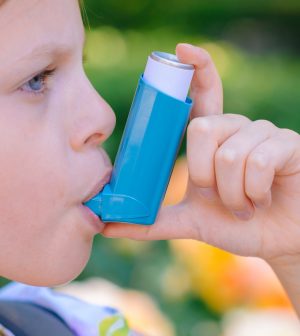- Could Your Grocery Store Meat Be Causing Recurring UTIs?
- Are You Making This Expensive Thermostat Error This Winter?
- Recognizing the Signs of Hypothyroidism
- 10 Strategies to Overcome Insomnia
- Could Artificial Sweeteners Be Aging the Brain Faster?
- Techniques for Soothing Your Nervous System
- Does the Water in Your House Smell Funny? Here’s Why
- Can a Daily Dose of Apple Cider Vinegar Actually Aid Weight Loss?
- 6 Health Beverages That Can Actually Spike Your Blood Sugar
- Treatment Options for Social Anxiety Disorder
Does Your Child Have Asthma? Here’s How to Prepare Them to Go Back to School

Whether your child attends a year-round school or one on a traditional calendar, parents can take steps to make classroom reentry healthier for kids with asthma.
Asthma causes an estimated 13.8 million missed school days each year, according to the Respiratory Health Association. That’s more than any other chronic illness.
Having an inhaler on hand at school is one important step for kids with asthma.
If your child experiences frequent asthma symptoms, visit a doctor as soon as possible, the Respiratory Health Association recommends. Make sure your child has a written Asthma Action Plan that you can share with the school nurse.
Help your child practice taking asthma medication. Make sure your child understands how important it is to keep the medicine close by at all times.
Call or visit the school or district to fill out any needed consent forms so your child can carry an inhaler at school. Save the prescription label from your child’s asthma medication to provide with the form.
Keep an extra quick-relief inhaler where needed, whether in the home or at school.
Talk with teachers to make sure they understand your child’s asthma “triggers,” recognize asthma symptoms and know what to do if symptoms happen, the association recommends.
Hand-washing and covering the mouth while coughing is important to prevent common cold and flu viruses that can make asthma symptoms worse, so be sure your child knows about this.
Be sure to get your child an annual flu shot to help them stay safer from these upper respiratory viral infections.
Don’t skip doses of long-term control medications. Missing meds can lead to increased symptoms.
The Respiratory Health Association offers a “Fight Asthma Now” program that can be helpful in schools. You can ask your school’s administrators if they have it on board or suggest it.
More information
The U.S. Centers for Disease Control and Prevention has more on managing asthma in schools.
SOURCE: Respiratory Health Association
Source: HealthDay
Copyright © 2026 HealthDay. All rights reserved.










